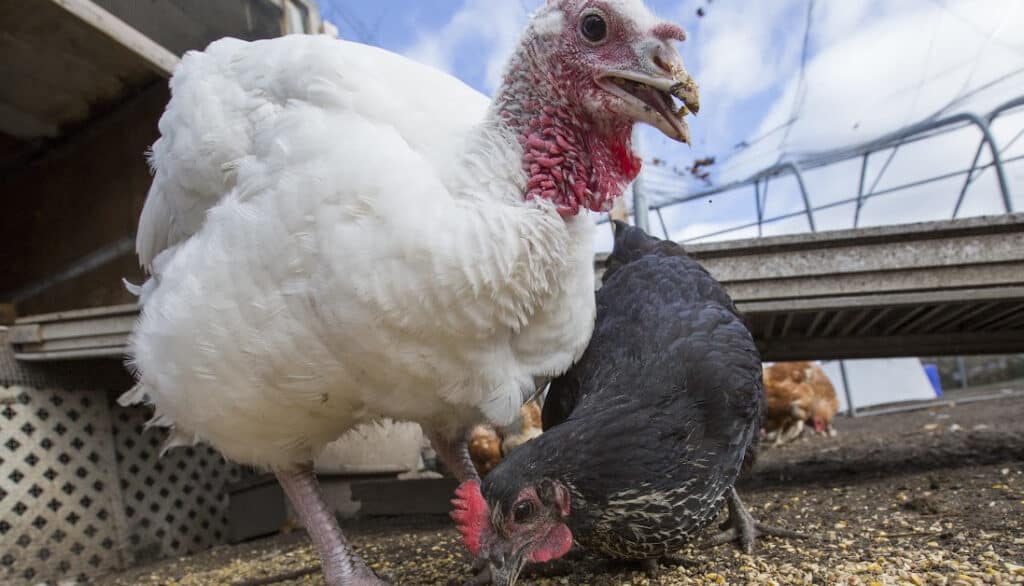As loving dog owners, we always strive to ensure that our furry friends enjoy a healthy and happy life. However, just like humans, dogs can develop allergies that can impact their well-being. One such allergy that might come as a surprise to many is an allergy to turkey. While turkey is often considered a nutritious and tasty protein source for dogs, it can also trigger an allergic reaction in some sensitive canines. In this comprehensive guide, we will delve into the world of turkey allergies in dogs, discussing the prevalence, symptoms, causes, and treatment options.
We will also explore related allergies and address common concerns surrounding the compatibility of chicken and turkey for dogs with poultry allergies. Our aim is to provide you with the knowledge and tools needed to identify and manage turkey allergies in your precious pup, ensuring they remain healthy, happy, and well-fed. So, let’s dive in and learn more about this often-overlooked canine allergy.

Understanding Turkey Allergies in Dogs: An Overview
Just like people, dogs can have allergies to various foods, and turkey is no exception. Turkey allergies in dogs occur when their immune system mistakenly identifies turkey proteins as a harmful substance, triggering an allergic response. This reaction can manifest in several ways, ranging from mild itching to more severe gastrointestinal issues. It’s essential for dog owners to be aware of the possibility of a turkey allergy. It can significantly impact their pet’s quality of life if left unaddressed.
Although turkey is often recommended as a lean and easily digestible protein source for dogs, it’s not a one-size-fits-all solution. Some dogs may be perfectly fine consuming turkey. Others may develop an allergy over time or exhibit a reaction from their first exposure.
The Prevalence of Turkey Allergies Among Dogs: How Common is it?
When it comes to food allergies in dogs, turkey might not be the first ingredient that comes to mind. However, turkey allergies are more common than one might expect. The exact prevalence of turkey allergies in dogs is not well-documented. It is generally considered to be one of the more common protein allergens alongside chicken, beef, and dairy.
It’s important to note that food allergies, in general, account for only a small percentage of overall canine allergies. Environmental factors such as pollen, mold, and dust mites are far more likely to cause allergic reactions in dogs. Nevertheless, food allergies can still have a significant impact on a dog’s health and should not be overlooked.
The prevalence of turkey allergies among dogs may be partly due to the widespread use of turkey as an ingredient in commercial dog foods and treats. Turkey is often perceived as a healthy and easily digestible protein source. Many pet food manufacturers include it in their recipes. As a result, dogs are frequently exposed to turkey, which can increase the likelihood of developing an allergy over time.

Recognizing the Tell-Tale Signs: Symptoms of Turkey Allergies in Dogs
As a dog owner, it’s essential to be able to recognize the symptoms of a turkey allergy in your canine companion. By identifying these tell-tale signs early on, you can take the necessary steps to address the issue and minimize any discomfort your dog may be experiencing. Symptoms of turkey allergies in dogs can vary widely and may include one or a combination of the following:
- Skin issues: One of the most common symptoms of a turkey allergy in dogs is skin irritation. This can manifest as redness, itching, hot spots, or even hair loss. Dogs may scratch, bite, or lick the affected areas excessively, which can exacerbate the problem and potentially lead to infections.
- Ear infections: Dogs with turkey allergies may be more prone to developing ear infections. The ears may appear red, swollen, or have an unpleasant odor. Your dog may also shake their head or scratch their ears frequently, indicating discomfort.
- Gastrointestinal problems: A turkey allergy can also result in gastrointestinal issues such as vomiting, diarrhea, or constipation. In some cases, dogs may experience frequent bouts of flatulence or display signs of abdominal discomfort.
- Respiratory issues: While less common, some dogs with turkey allergies may exhibit respiratory symptoms such as coughing, sneezing, or difficulty breathing.
- Behavioral changes: Dogs experiencing discomfort due to a turkey allergy may become more irritable or lethargic. They may also show a decreased interest in activities they once enjoyed, such as playing or going for walks.
It’s important to note that these symptoms can also be indicative of other allergies or health issues. It’s crucial to consult with a veterinarian for a proper diagnosis. This information will help your vet determine the best course of action to effectively address your dog’s allergy and improve their quality of life.
Uncovering the Culprits: Causes of Turkey Allergies in Dogs
As pet parents, it’s only natural to want to identify the root cause of our dog’s discomfort when faced with an allergy. In the case of turkey allergies, several factors can contribute to the development of this condition in our canine companions. By gaining a thorough understanding of these potential triggers, you will be better equipped to manage your dog’s turkey allergy and prevent future flare-ups, ensuring their continued health and happiness.

Turkey-based Dog Foods and Treats
One of the most apparent sources of turkey allergies in dogs is their diet, specifically turkey-based dog foods and treats. Many commercial dog food brands include turkey as a primary protein source due to its reputation as a lean, easily digestible, and nutritious option. This widespread use of turkey in dog foods means that our furry friends are frequently exposed to it. This increases the likelihood of developing an allergy over time.
In addition to their regular meals, dogs may also be exposed to turkey through various treats, chews, and even some dental care products. These items often contain turkey meal, turkey by-products, or turkey flavorings. This can also trigger an allergic reaction in sensitive dogs.
When investigating potential causes of a turkey allergy in your dog. It’s essential to carefully examine the ingredient lists of all the foods and treats they consume. Keep an eye out for any mention of turkey or turkey-derived ingredients. These can be the primary culprits behind your dog’s allergy symptoms.
Chews Containing Turkey Ingredients
When it comes to identifying the causes of turkey allergies in dogs, we often focus on their main meals and treats. However, it’s important not to overlook another potential source of exposure: chews containing turkey ingredients. These chews are often designed to promote dental health, and provide mental stimulation. Or they can simply satisfy a dog’s natural urge to chew. They can contain hidden turkey components that may trigger an allergic reaction in susceptible canines.
Turkey-based chews can include items such as rawhide or other dental chews, bully sticks, and even some types of bones or tendons. The presence of turkey in these products may not always be obvious, as it can be listed under various names, including turkey meal, hydrolyzed turkey protein, or even just as “natural flavorings.
To ensure that you are not inadvertently exposing your dog to allergenic turkey ingredients, it’s crucial to carefully read the labels of all chews and dental products you provide to your pet. Look for any mention of turkey or turkey-derived components. Consider opting for chews made from alternative protein sources or plant-based materials if your dog has a known turkey allergy.

Vaccines, Medications, and Supplements with Turkey Components
While it may seem surprising, some vaccines, medications, and supplements can contain turkey components, albeit in small amounts. These sources are less likely to cause an allergic reaction in dogs compared to their diet. However, it’s still important to be aware of this possibility, especially for dogs with severe turkey allergies.
In some cases, turkey-derived ingredients may be used as a protein source or as a stabilizer in certain medications or supplements. For instance, some glucosamine and chondroitin supplements for joint health may contain hydrolyzed turkey cartilage, while certain medications might use turkey proteins as a binding agent.
When it comes to vaccines, the risk of exposure to turkey components is minimal. However, it’s always a good idea to discuss your dog’s allergies with your veterinarian before administering any vaccines, medications, or supplements to ensure the products used are safe for your dog.
If your dog has a known turkey allergy, inform your veterinarian and request that they double-check the ingredients of any prescribed medications or supplements. In many cases, alternative products without turkey components can be recommended, minimizing the risk of an allergic reaction.
While it’s less common for turkey components in vaccines, medications, and supplements to trigger a turkey allergy in dogs, being aware of this potential source and discussing your concerns with your veterinarian can help ensure your dog’s safety and overall well-being.
Tackling Turkey Allergies: Effective Treatments for Affected Dogs
If your dog has been diagnosed with a turkey allergy, you may be wondering how to manage this condition effectively and alleviate their discomfort. The primary treatment for food allergies, including turkey allergies, involves removing the allergen from your dog’s diet.
- Consult your veterinarian: The first and most crucial step is to consult with your veterinarian to confirm the diagnosis and discuss appropriate treatment options.
- Implement a diet trial: An elimination diet typically involves feeding your dog a hypoallergenic or limited-ingredient diet for a specified period, usually 6 to 12 weeks. During this time, it’s essential to avoid feeding your dog any treats, chews, or supplements that contain turkey.
- Monitor for improvements: As you transition your dog to the new diet, carefully observe any changes in their allergy symptoms. If their symptoms improve or disappear entirely, it’s likely that turkey was the primary allergen causing their discomfort.
- Reintroduce foods cautiously: Once the allergen has been identified, you can slowly reintroduce other foods into your dog’s diet, one at a time, while carefully monitoring their reaction. This will help you determine if your dog has any additional allergies or sensitivities.
- Choose alternative protein sources: To maintain your dog’s health and well-being. It’s important to find an alternative protein source that doesn’t trigger their turkey allergy. Your veterinarian can help you identify suitable options, such as fish, lamb, or novel proteins like kangaroo or venison.
- Maintain a turkey-free diet: Once you have successfully identified a new diet that doesn’t trigger your dog’s allergy symptoms. It’s essential to maintain this turkey-free diet long-term. This includes carefully selecting treats, chews, and supplements that do not contain any turkey components.
By tackling your dog’s turkey allergy through dietary adjustments you can effectively manage their condition and ensure they lead a comfortable, healthy, and happy life.

Exploring Related Allergies: Are There Any Similarities?
When it comes to food allergies in dogs, it’s not uncommon for a dog to be allergic to more than one type of protein. In the case of turkey allergies, it’s essential to consider the possibility of related allergies, as they may share similarities in their protein structure or trigger similar immune responses.
- Chicken allergies: One of the most closely related allergies to turkey is chicken. Given that both turkey and chicken are poultry, their proteins share structural similarities, which can cause cross-reactivity in some dogs. This means that a dog allergic to turkey may also be allergic to chicken, and vice versa.
- Egg allergies: As birds, both chickens and turkeys lay eggs, and their proteins can be similar in structure. Therefore, a dog with a turkey or chicken allergy may also react to eggs, although this is not always the case. It’s crucial to monitor your dog’s reaction to eggs if they have a known poultry allergy. Consult your veterinarian for guidance on including or excluding eggs from their diet.
- Other poultry allergies: Dogs with turkey allergies may also be at risk of developing allergies to other types of poultry, such as duck, goose, or quail. Although these proteins may not be as similar to turkey as chicken, it’s still essential to be cautious when introducing new poultry proteins to a dog with a known turkey allergy.
If your dog has a turkey allergy, it’s crucial to be aware of these related allergies and the potential for cross-reactivity. When introducing new foods or proteins to your dog’s diet, do so gradually and monitor their reaction closely. By understanding the connections between turkey and other related allergies, you can make informed decisions about your dog’s diet and minimize the risk of further allergic reactions.
Chicken vs. Turkey Allergies: Can Dogs with Chicken Allergies Eat Turkey Safely?
As a dog owner, you may be wondering whether your dog with a chicken allergy can safely consume turkey. While turkey and chicken are both poultry and share some similarities in their protein structure, it’s important to note that they are still distinct proteins. Consequently, a dog allergic to chicken is not necessarily allergic to turkey.
That being said, cross-reactivity between chicken and turkey allergies can occur in some dogs due to the structural similarities of their proteins. This means that a dog with a chicken allergy may also react to turkey, although this is not a guarantee.
When it comes to feeding your dog with a known chicken allergy, it’s best to approach introducing turkey with caution. Consult your veterinarian for guidance on whether it’s appropriate to include turkey in your dog’s diet. If you do decide to introduce turkey, do so gradually and monitor your dog closely for any signs of an allergic reaction.
It’s crucial to remember that every dog is unique, and their individual reactions to various proteins can vary widely. Just because your dog has a chicken allergy does not automatically mean they will be allergic to turkey. However, it’s always best to err on the side of caution and consult with your veterinarian before making any significant dietary changes.

Poultry Allergies and Beyond: Understanding Cross-Reactions with Chicken, Turkey, and Eggs
As a pet parent, it’s important to understand the potential cross-reactions between different types of poultry allergies, such as chicken, turkey, and eggs. By gaining a deeper understanding of these connections, you can better manage your dog’s dietary needs and minimize the risk of further allergic reactions. Let’s explore the relationship between these common allergens and how they may affect your dog.
- Chicken and turkey cross-reactivity: As mentioned earlier, chicken and turkey are both poultry, and their proteins share structural similarities. This can cause cross-reactivity in some dogs. That means that a dog allergic to one type of poultry may also be allergic to the other. However, it’s important to note that not all dogs with a chicken allergy will be allergic to turkey and vice versa.
- Egg allergies: Eggs can also be a source of cross-reactivity in dogs with poultry allergies. They share some protein similarities with chicken and turkey. However, this is not always the case, and some dogs may tolerate eggs even if they have a poultry allergy.
- Other poultry and bird proteins: In addition to chicken, turkey, and eggs, dogs with poultry allergies may also be at risk of developing allergies to other types of bird proteins, such as duck, goose, or quail. These proteins may not be as closely related to turkey or chicken. It’s still essential to be cautious when introducing new poultry proteins to a dog with a known allergy.
Understanding the potential cross-reactions between chicken, turkey, and eggs is essential in managing your dog’s dietary needs effectively. By being aware of the potential connections between these allergens, you can make informed decisions about your dog’s diet, minimize the risk of allergic reactions, and ensure their continued health and well-being.
Allergy Alternatives: Can Dogs with Turkey Allergies Safely Consume Chicken?
As a pet owner with a dog diagnosed with a turkey allergy, you may be searching for alternative protein sources for your furry friend. One common question that arises is whether dogs with turkey allergies can safely consume chicken. Turkey and chicken are both poultry and share some similarities in their protein structures. However, they are distinct proteins, and an allergy to one does not automatically mean an allergy to the other.
However, as previously mentioned, cross-reactivity can occur between chicken and turkey allergies in some dogs due to their structural similarities. This means that a dog allergic to turkey might also react to chicken, although this is not a guarantee.

Conclusion
In conclusion, managing turkey allergies in dogs involves understanding the various potential sources of allergens, recognizing related allergies, and exploring alternative protein sources. Work closely with your veterinarian and educate yourself about the connections between turkey, chicken, and other related allergens. This way you can make informed decisions about your dog’s diet and minimize the risk of allergic reactions.
Remember that every dog is unique, and their individual reactions to different proteins can vary. Always approach dietary changes with caution and consult your veterinarian for guidance on the best course of action based on your dog’s specific needs and medical history. By staying vigilant, reading labels carefully, and maintaining open communication with your veterinarian, you can help your dog navigate their turkey allergy and ensure they lead a comfortable, healthy, and happy life.
~Lindsie
